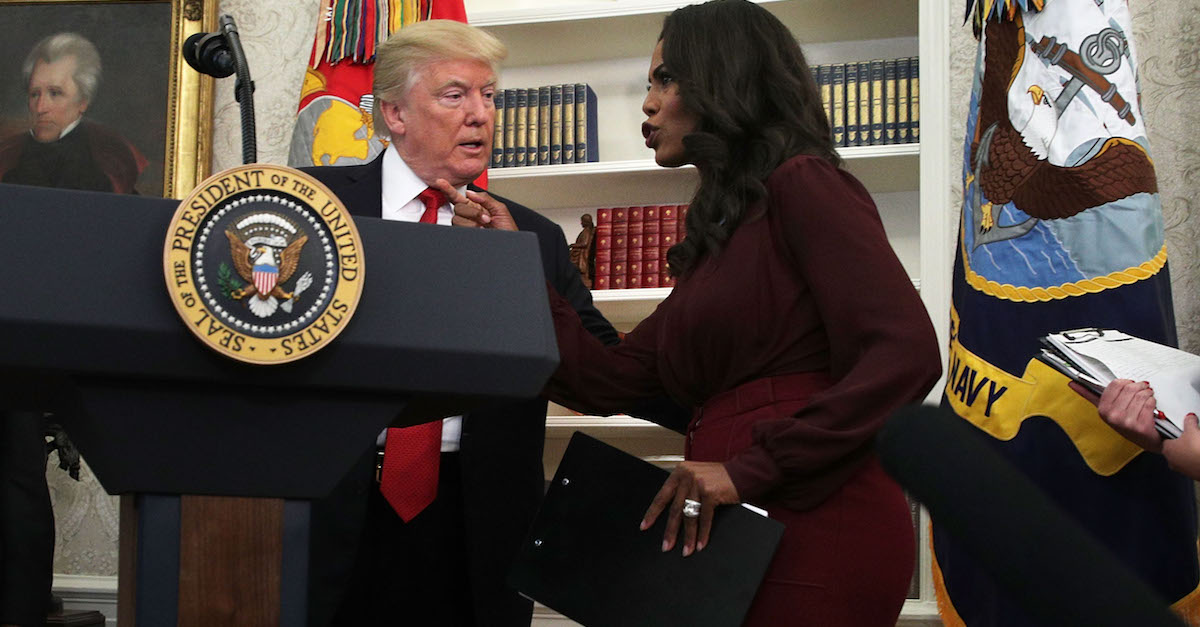
White House officials are looking into legal options with regards to preventing Omarosa Manigault Newman from releasing more of the recordings she made during her stint working for President Donald Trump, according to an ABC News report. The former Apprentice contestant has been teasing various comments and conversations that were allegedly made in the White House, in promotion of soon-to-be-released book, and has used the existence of recorded discussions as a means to give credence to her claims.
White House Press Secretary Sarah Huckabee Sanders addressed the recordings, which include one where Chief of Staff John Kelly fired Omarosa. A newly-released conversation with Trump himself that Omarosa shared Monday morning made it seem that the president had been unaware of the dismissal before it happened.
“The very idea a staff member would sneak a recording device into the White House Situation Room, shows a blatant disregard for our national security –- and then to brag about it on national television further proves the lack of character and integrity of this disgruntled former White House employee,” Sanders said.
It may be understandable for the White House to want to prevent more leaks from getting out–especially if they include potentially embarrassing or incriminating information–but legal precedent is not on their side when it comes to stopping it, or punishing Omarosa for making the recordings. As national security attorney Mark Zaid pointed out, not only is it doubtful that Omarosa broke any laws, the Supreme Court has made it quite difficult to prevent the release of information, controversial though it may be.
Thus far no reasonable prosecutable offense has been identified. Taping legal in DC. Importantly, WH would never be able to obtain injunction against release of tapes due to high standards set by SCOTUS in NYT v. US, 403 U.S. 713 (1971)(Pentagon Papers case). https://t.co/sA3ymqa338
— Mark S. Zaid (@MarkSZaidEsq) August 13, 2018
Prior restraints on speech are generally found to be unconstitutional except for the most extreme cases. In the case Zaid referred to, New York Times v. United States, the Supreme Court allowed the publication of the Pentagon Papers, classified documents related to a Defense Department study on the Vietnam War. Despite the national security concerns expressed by the government, the Court allowed the publication of the documents. That precedent should provide Omarosa with all the protection she needs to release whatever recordings she has.
As for punishing her for making the recordings in the first place, she’s likely in the clear. Washington, D.C. is a one-party consent jurisdiction when it comes to recording conversations, meaning that it’s not legally necessary for everyone in a conversation to be aware of or consent to having a conversation recorded.
Former White House Press Secretary Sean Spicer indicated that the recordings may still have been illegal, given their nature, but he didn’t appear to back this up.
“It’s an unbelievable violation of protocol and the law,” Spicer said. “You can lose your security clearance for bringing your device into SCIF — to bring it in is a violation but to willfully record it — you’re entering a whole other realm.”
It may be true that what Omarosa did would warrant being stripped of security clearance, but as Law&Crime’s Colin Kalmbacher discussed, it’s unlikely that the substance of these recordings were such that they crossed the line into criminal activity. Unless the recordings captured discussions related to national defense, she’s probably in the clear.
[Image via Alex Wong/Getty Images]